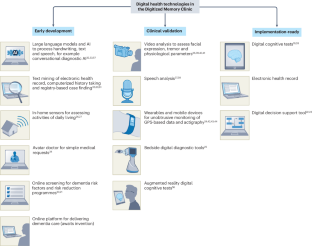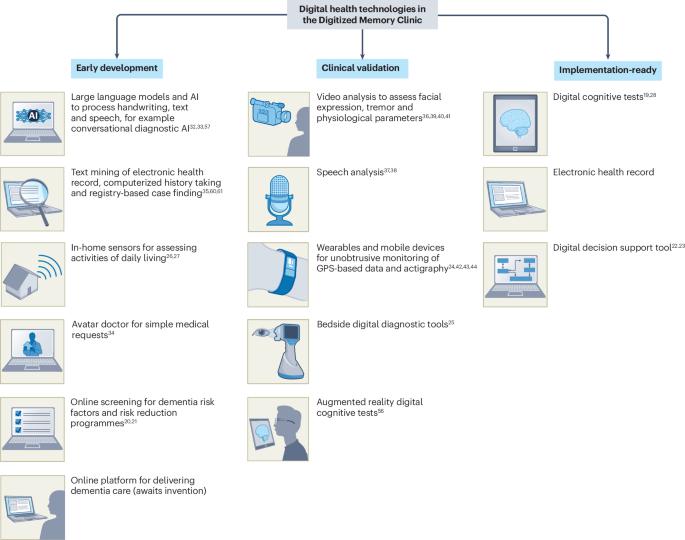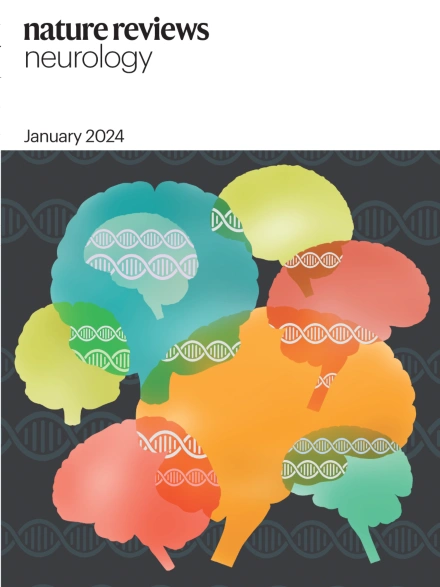数字化记忆诊所
IF 28.2
1区 医学
Q1 CLINICAL NEUROLOGY
引用次数: 0
摘要
人口老龄化、劳动力减少以及最近针对阿尔茨海默病的突破性疗法的实施等几大挑战促使人们对神经退行性痴呆症患者的诊断和医疗管理方式进行必要的反思。数字医疗技术可以在这一转变中发挥关键作用,因为新技术可以从一个人身上收集数百万个数据点。可能的应用包括有助于早期发现疾病的非侵入性监测和基于人工智能的健康建议。要将这些进步转化为对疾病患者的切实益处,必须在一个保留医生专家作为决策核心人物的系统中实施这些技术。本视角为神经退行性痴呆症的诊断路径提出了一个新的框架,称为 "数字化记忆诊所"(Digitized Memory Clinic),它将数字健康技术与目前可用的评估工具(如体液和成像生物标志物)结合起来,与医生相互配合。数字化记忆诊所将对整个疾病谱的患者进行管理,从检测认知能力下降的风险因素到痴呆症的最早症状,并将取代目前纯粹的 "实体 "记忆诊所模式。在记忆诊所实施数字医疗技术,需要解决与之相关的重要伦理、法律和社会障碍。设想中的数字化记忆诊所旨在改进诊断,实现对记忆障碍患者的精确疾病跟踪预后,并开辟新的可能性,如用于预防和治疗的精准医学。本文章由计算机程序翻译,如有差异,请以英文原文为准。


The Digitized Memory Clinic
Several major challenges, including an ageing population and declining workforce and the implementation of recent breakthrough therapies for Alzheimer disease, are prompting a necessary rethink of how people with neurodegenerative dementias are diagnosed and medically managed. Digital health technologies could play a pivotal part in this transformation, with new advances enabling the collection of millions of data points from a single individual. Possible applications include unobtrusive monitoring that aids early detection of disease and artificial intelligence-based health advice. To translate these advances to meaningful benefits for people living with a disease, technologies must be implemented within a system that retains the physician expert as a central figure in decision-making. This Perspective presents a new framework, termed the Digitized Memory Clinic, for the diagnostic pathway of neurodegenerative dementias that incorporates digital health technologies with currently available assessment tools, such as fluid and imaging biomarkers, in an interplay with the physician. The Digitized Memory Clinic will manage people across the entire disease spectrum, from the detection of risk factors for cognitive decline and the earliest symptoms to dementia, and will replace the present paradigm of a pure ‘brick-and-mortar’ memory clinic. Important ethical, legal and societal barriers associated with the implementation of digital health technologies in memory clinics need to be addressed. The envisioned Digitized Memory Clinic aims to improve diagnostics and enable precise disease-tracking prognostication for individuals with memory disorders and to open new possibilities, such as precision medicine for prevention and treatment. In this Perspective, the authors present the Digitized Memory Clinic, a new framework for the diagnostic pathway of neurodegenerative dementias that incorporates digital health technologies with currently available assessment tools, such as fluid and imaging biomarkers, in an interplay with the physician.
求助全文
通过发布文献求助,成功后即可免费获取论文全文。
去求助
来源期刊

Nature Reviews Neurology
医学-临床神经学
CiteScore
29.90
自引率
0.80%
发文量
138
审稿时长
6-12 weeks
期刊介绍:
Nature Reviews Neurology aims to be the premier source of reviews and commentaries for the scientific and clinical communities we serve. We want to provide an unparalleled service to authors, referees, and readers, and we work hard to maximize the usefulness and impact of each article. The journal publishes Research Highlights, Comments, News & Views, Reviews, Consensus Statements, and Perspectives relevant to researchers and clinicians working in the field of neurology. Our broad scope ensures that the work we publish reaches the widest possible audience. Our articles are authoritative, accessible, and enhanced with clearly understandable figures, tables, and other display items. This page gives more detail about the aims and scope of the journal.
 求助内容:
求助内容: 应助结果提醒方式:
应助结果提醒方式:


